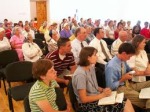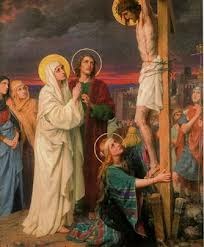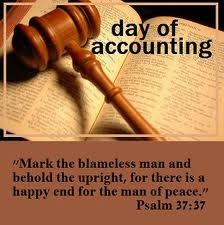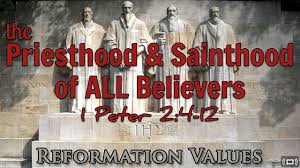 The Pinnacle Of A Pyramid Is Really Up There!
The Pinnacle Of A Pyramid Is Really Up There!
I am tired of a hierarchal pyramid church structure telling me that we are a “family”, the family of God, where we play different roles like mother, father, child, pet dog, etc., but we are equal as family members. I know very few Christians who view their pastor as an equal. His position dictates his spirituality, thus one elevates his stature, often out of noble causes like respect. Church elders, deacons, and board members are treated differently again out of respect to an elevated position. The pastor is looked upon as a super Christian, the leadership as superb Christians while regular none titled members feel inferior, rejected, and sometimes even lost.
 I have been impressed, but the last three pastors at our local church have been home grown, birthed, nurtured, and equipped in the faith by our own local body. The last two were saved as youth, went off to seminary only to return to their home church, became Youth Ministers, and eventually given the reigns of leadership as senior pastor. What has been tragic is a pattern I have seen develop over the last two decades: People come, get inspired, become active, given leadership positions, directed up the hierarchal ladder in positioning until they have attained top positions as elders or pastors. The trouble comes when they resign.
I have been impressed, but the last three pastors at our local church have been home grown, birthed, nurtured, and equipped in the faith by our own local body. The last two were saved as youth, went off to seminary only to return to their home church, became Youth Ministers, and eventually given the reigns of leadership as senior pastor. What has been tragic is a pattern I have seen develop over the last two decades: People come, get inspired, become active, given leadership positions, directed up the hierarchal ladder in positioning until they have attained top positions as elders or pastors. The trouble comes when they resign. The last two resigning pastors left so they would not be in conflict with the new pastor. 80% of resigning elders also left the congregation over disputes or conflicts. Those respected as leaders because of the “character” of their lives, abandoned the character of the family when conflict rose its nasty head, and the fall from high up leadership down the bumpy pyramidal wall became rocky and brutal, forcing resignations, hurt, and despair. Leadership preaches how to solve conflict, but have not modeled it very well in the past. This is not only true for my local church, but churches everywhere, and it got to stop.
The last two resigning pastors left so they would not be in conflict with the new pastor. 80% of resigning elders also left the congregation over disputes or conflicts. Those respected as leaders because of the “character” of their lives, abandoned the character of the family when conflict rose its nasty head, and the fall from high up leadership down the bumpy pyramidal wall became rocky and brutal, forcing resignations, hurt, and despair. Leadership preaches how to solve conflict, but have not modeled it very well in the past. This is not only true for my local church, but churches everywhere, and it got to stop.
We need to look for “linear” models of leadership, not hierarchal ones. We need leaders beside their people, not above them, so when someone falls, there won’t be permanent damage by falling a great distance. That is why we MUST apply I John 3:16, the laying down of our life for our brethren, as a mandatory Christian practice. If we are laying down our life, one will fall on top of you when they fall, not fall beneath you to be trampled. We can pick each other up together! That is body ministry!
Instead of diversity and our weaknesses hindering us, if we embrace the five fold as a linear ministry of equal peers accepting one another as a priesthood of believers, our strengths will breach each other’s weaknesses, and the body as a whole will be strong.
I have a personal friend who has been so damaged by the revolving door of pastors at his church over the years, that he now is skeptical about building a relationships with any new pastor, which is a lonely position to be in. Just because someone is paid as a professional does not elevate his spiritual status nor eliminate his need for fellowship and relational commitments. We have to think linearly.
 Attending a funeral yesterday brought home the feeling of lost no matter how many times you attend funerals. Grieving comes with loss. Every time a pastor leaves a congregation there is lost, but we do not look at it that way, nor give the congregation time to process it that way, but immediately build hype about the expectations of a new leader with new hope, new life, and new direction. Families grieve over loss. The Family of God, the local church, needs to do the same, or embrace those who have fallen from their hierarchal positions to allow them to be regular pew sitting Christians again. They are equal brothers and sisters in Christ Jesus; let’s treat them that way if they allow us.
Attending a funeral yesterday brought home the feeling of lost no matter how many times you attend funerals. Grieving comes with loss. Every time a pastor leaves a congregation there is lost, but we do not look at it that way, nor give the congregation time to process it that way, but immediately build hype about the expectations of a new leader with new hope, new life, and new direction. Families grieve over loss. The Family of God, the local church, needs to do the same, or embrace those who have fallen from their hierarchal positions to allow them to be regular pew sitting Christians again. They are equal brothers and sisters in Christ Jesus; let’s treat them that way if they allow us.
 I am tired of the awkwardness of hierarchal changes in leadership structures, looking at the fall of one as being the potential for rise for another. True linear leadership never “lords” or “hovers over” nor “micromanages” those below them, but walks beside them. Jesus is the true example of that process. He always walked with his disciples. When ascending to heaven, above his brethren, he sent his Spirit, the Holy Spirit, the Spirit of Jesus Christ, to not only walk with believers but personally indwell them. “Do you not know your body is the Temple of the Holy Spirit?” Even his Spirit is not in a hierarchal position over you, but with you, in you, being a part of you! Relationally, as believers in Jesus Christ, that is where we should be with each other, then no man can fall far, only into the arms of the one beside them! That is commitment; that is unity; that is the truth of Body of Christ if we follow linear leadership. We must be our brother’s keepers, even when they have fallen!
I am tired of the awkwardness of hierarchal changes in leadership structures, looking at the fall of one as being the potential for rise for another. True linear leadership never “lords” or “hovers over” nor “micromanages” those below them, but walks beside them. Jesus is the true example of that process. He always walked with his disciples. When ascending to heaven, above his brethren, he sent his Spirit, the Holy Spirit, the Spirit of Jesus Christ, to not only walk with believers but personally indwell them. “Do you not know your body is the Temple of the Holy Spirit?” Even his Spirit is not in a hierarchal position over you, but with you, in you, being a part of you! Relationally, as believers in Jesus Christ, that is where we should be with each other, then no man can fall far, only into the arms of the one beside them! That is commitment; that is unity; that is the truth of Body of Christ if we follow linear leadership. We must be our brother’s keepers, even when they have fallen!




















































































